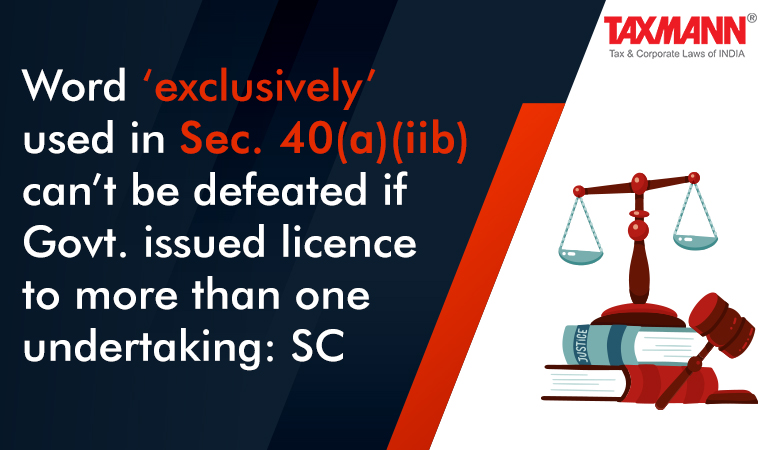Word ‘exclusively’ used in Sec. 40(a)(iib) can’t be defeated if Govt. issued licence to more than one undertaking: SC
- Blog|News|Income Tax|
- 2 Min Read
- By Taxmann
- |
- Last Updated on 5 January, 2022

Case Details: Kerala State Beverages Manufacturing & Marketing Corporation Ltd. v. ACIT - [2022] 134 taxmann.com 11 (SC)
Judiciary and Counsel Details
-
- R. Subhash Reddy and Hrishikesh Roy, JJ.
Facts of the Case
Assessee-Kerala State Beverages Manufacturing & Marketing Corporation Ltd. was a State-owned Undertaking engaged in beverages wholesale and retail trade. It held FL-9 and FL-1 licences to deal in wholesale and retail of Indian Made Foreign Liquor (IMFL) and Foreign Made Foreign Liquor (FMFL) granted by the Excise Department.
During the assessment, the Assessing Officer (AO) disallowed payment of gallonage fee, licence fee, shop rental (kist), the surcharge on sales tax and turnover tax under Section 40(a)(iib). Matter carried to High Court, and it was held that gallonage fee, licence fee and shop rental (kist) were not an exclusive levy on the assessee, and thus no disallowance could be made.
Further, the surcharge on sales tax and turnover tax is not a ‘fee’ or ‘charge’ within the meaning of Section 40(a)(iib) to attract disallowance. Against the ruling of High Court, Revenue filed an appeal before the Supreme Court.
Supreme Court Held
The Supreme Court of India held that section 40(a)(iib) provides that any amount levied exclusively on the State-owned undertaking cannot be claimed as a deduction.
The aspect of exclusivity under Section 40(a)(iib) is not to be considered with a narrow interpretation, which will defeat the very intention of the Legislature. The aspect of ‘exclusivity’ has to be viewed from the nature of undertaking on which levy is imposed and not on the number of undertakings on which the levy is imposed.
It is pretty well settled that the interpretation is to be in the manner which will subserve and promote the object and intention behind the legislation. To defeat the provisions of section 40(a)(iib), the State Governments may issue licences to more than one State-owned undertakings. They may ultimately say it is not an exclusive undertaking, and therefore Section 40(a)(iib) is not attracted.
Therefore, the view taken by High Court can’t be accepted and the statutory fees etc., viz., gallonage fees, licence fee, and shop rental (kist) levied on assessee cannot be claimed as deduction.
As far as surcharge on sales tax is concerned, it is settled legal position that a surcharge on a tax is nothing but the enhancement of the tax. Further, turnover tax is also a tax. Accordingly, such surcharge on sales tax and turnover tax can’t be treated as a fee or charge coming within the scope of Section 40(a)(iib).
Disclaimer: The content/information published on the website is only for general information of the user and shall not be construed as legal advice. While the Taxmann has exercised reasonable efforts to ensure the veracity of information/content published, Taxmann shall be under no liability in any manner whatsoever for incorrect information, if any.

Taxmann Publications has a dedicated in-house Research & Editorial Team. This team consists of a team of Chartered Accountants, Company Secretaries, and Lawyers. This team works under the guidance and supervision of editor-in-chief Mr Rakesh Bhargava.
The Research and Editorial Team is responsible for developing reliable and accurate content for the readers. The team follows the six-sigma approach to achieve the benchmark of zero error in its publications and research platforms. The team ensures that the following publication guidelines are thoroughly followed while developing the content:
- The statutory material is obtained only from the authorized and reliable sources
- All the latest developments in the judicial and legislative fields are covered
- Prepare the analytical write-ups on current, controversial, and important issues to help the readers to understand the concept and its implications
- Every content published by Taxmann is complete, accurate and lucid
- All evidence-based statements are supported with proper reference to Section, Circular No., Notification No. or citations
- The golden rules of grammar, style and consistency are thoroughly followed
- Font and size that’s easy to read and remain consistent across all imprint and digital publications are applied



 CA | CS | CMA
CA | CS | CMA
